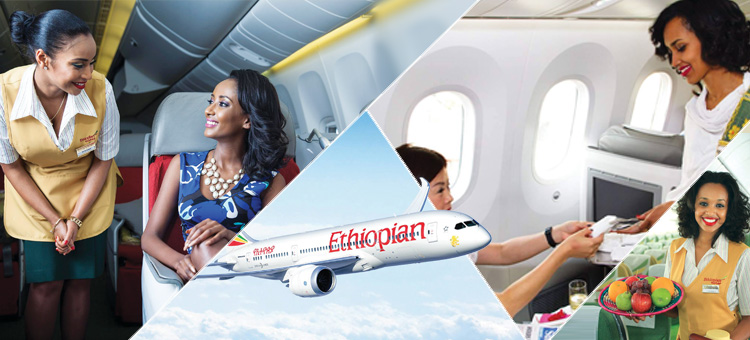Mumbai: Tigist Eshetu, Regional Director – India Sub-continent, Ethiopian Airlines is a 19-year veteran with the airline group who took up the new role just a few months ago. In an exclusive interview with Destination Reporter, she speaks about her priorities and plans for the future.
The airline is evaluating if it can operate the Mumbai – Johannesburg route discontinued by South African Airways
2019 must have been a very challenging year for the airline especially the tragic crash in March when four Indians were among those killed and then in June when India issued a travel advisory after attacks on expats. Can you comment?
Ethiopian Airlines is engaged constantly in enhancing its capability including safety and security. Regarding the tragic incident in March 2019, as the accident was caused due to some technical features of the aircraft, Ethiopian has grounded the remaining Boeing 737 MAX 8 aircraft. As you are aware, similar measures have been taken by almost all carriers operating the said model of aircraft. We have not witnessed any drop in traffic due to the travel advisory as the attack was an isolated incident.
In August 2019 you added a third entry point in India – Bengaluru, after Mumbai and New Delhi. How has the response been?
As Bengaluru is an internationally recognised IT hub that has growing demand from all over the world, this has helped the new route to have sufficient traction. Since launch, this route is functioning smoothly and the outcomes are quite encouraging.
In August 2018, you commenced stopover packages targeting transit visitors to explore Ethiopia. What has been the outcome?
Given Addis Ababa is not only the capital city of Ethiopia, but also one of the major business centres in Africa with a large number of important regional institutions like the African Union, UN agencies, the World Bank as well as corporates, the 3-hour stopover package we have introduced is giving an opportunity to our esteemed customers and business travellers to experience the beautiful city of Addis Ababa which is also known for its culture, food and coffee, free of charge.
The Vision 2025 strategy of the airline was to cross 100 destinations which you achieved much earlier. What is the Vision 2030 target like? Can you elaborate on the program?
Currently, Ethiopian Airlines is building on what has been achieved, and working towards flying to additional destinations in Africa, Middle East, Asia, North & South America as well as Europe. The airline does not only want to add new destinations but continue to give world-class five star service to its clientele although it is a four star airline.
Besides the airline industry, the Ethiopian Group has also entered the five star hospitality segment through the recently inaugurated Ethiopian Skylight Hotel in Addis Ababa.
What has been the performance (uplift and load factor) in 2018 and 2019?
For the period July 1, 2018 to June 30, 2019, the uplift recorded in India was 1,85,629 passengers and the load factor 79.35 per cent. From July 1, 2019 to December 31, 2019, the uplift has been 90,974 passengers and the load factor 75.09 per cent. At this rate, when we report July 2019 to June 2020 numbers, we should have improved our performance compared to 2018-19 as the peak season is the next few months. 70 per cent of our traffic is transit which is huge. That is why we are targeting them for spending more time in the country through attractive packages created by Ethiopian Holidays.
Our Business Class is also performing well as the seats are very comfortable and the food served on board is also excellent. We have a wide choice of entertainment content and both on-board food and entertainment have Indian options too.
Tell us about how the MICE movement from India is faring? What percentage of total uplift in a year is MICE?
Last year we organised several MICE groups from Rotary, medical tourism and some cargo groups as well who hopefully will consider having their big gatherings in Addis Ababa this year as well. The Indian textile group is also holding an exhibition in Addis Ababa this month. We are trying to secure more MICE bookings.
Ethiopian is currently conducting market studies in Hyderabad, Chennai, Kolkata and Ahmedabad to gauge the African appetite of these cities. Have you zeroed in on the fourth city?
Yes, we have! And I am happy to announce the launch of our fourth destination in India – Chennai starting April, 2020. We will fly direct thrice weekly. We already have double daily direct flights to Mumbai and Delhi and service Bengaluru four times a week.
How is Ethiopian Holidays business doing in India? What kind of numbers are you handling currently?
Currently, we are promoting Ethiopian Holidays products widely. Although the responses have not been very high as expected, the campaign has helped to create awareness about Ethiopia. We had also organized a FAM trip for media in 2016 and the participants had provided encouraging feedback. A lot of Indians do book trips online from Ethiopian Holidays and we get rave reviews. But this number can really go up considering our air connectivity. We have Ethiopian Holidays packages being sold by travel agents and tour operators across India. Our GSAs work to promote the packages.
Tell us about your plans for the next three years for the airline and the holidays business?
Route expansion in terms of both cargo and passenger services is our focus. We will aggressively promote digitalization and also try to further enhance overall quality of our customer services to maintain our competitive position.
We will also be spending the forthcoming years creating awareness about Ethiopia, conducting workshops, giving presentations and also educating the MICE traveller to make Ethiopia a business as well as pleasure destination.
What are some of the sought-after experiences Indians should explore? Can you tell us more about the profile of the Indian clientele?
In Northern Ethiopia, the UNESCO® World Heritage Sites of Lalibela and Gondar, the holy city of Axum or cruising on the Lake Tana in Bahir Dar; explore the fascinating cultures of the ethnic groups which inhabit Omo Valley in Southern Ethiopia; indulge in a wildlife safari at the Awash National Park in Eastern Ethiopia; take a selfie at Erta Ale (Smoking Mountain) in north-eastern Ethiopia, the most active volcano in the region, and don’t miss the Bonga coffee tour – Bonga in south western Ethiopia is the birthplace of Arabica coffee.
My overall take is that our Indian customers are very polite, sociable and business-oriented. Overall, I found it unique that several Indians travelled as a family. Indians love to visit new countries and they are increasingly pursuing immersive experiences. We have beautiful spa resorts in Ethiopia and the Indian travellers enjoy these comforts. Of course, they are particular about vegetarian cuisine and Ethiopia is well equipped to cater to their needs.
We heard you are evaluating the Mumbai – Johannesburg route of South African Airways?
Yes, I met the visiting South African tourism minister in Mumbai in January. Ethiopian would be interested in operating the Mumbai – Johannesburg route which South African Airways has discontinued. I have briefed my head office and will wait for their final decision. I believe there is tremendous potential to grow this route.






